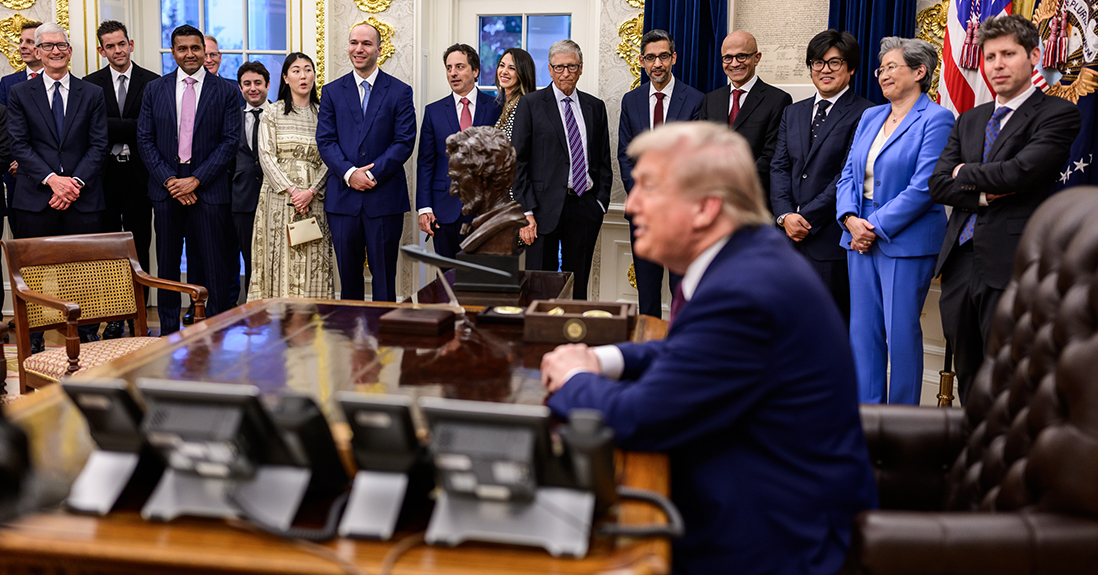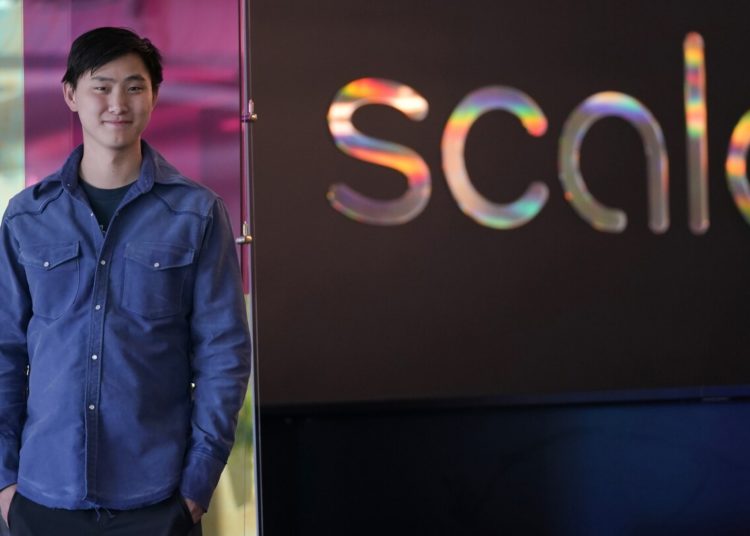President Trump Meets with Tech Leaders to Drive American AI Dominance

Introduction
Last night, President Donald J. Trump and the First Lady hosted an extraordinary gathering of technology industry leaders at the White House for an event focused on powering American AI dominance. The meeting, which included CEOs from major tech companies such as Google, Microsoft, and Apple, aimed to discuss ways to leverage AI technology to drive innovation and economic growth in the United States. This event marked a significant step towards strengthening America's position as a leader in the rapidly advancing field of artificial intelligence.
Key Details
During the meeting, President Trump emphasized the importance of investing in AI technology and developing a national strategy to maintain a competitive edge in this crucial area. He also highlighted the potential of AI to improve the lives of Americans and drive economic growth. The tech leaders in attendance shared their thoughts on the current state of AI in the US and the steps needed to maintain its dominance. Discussions also centered around the ethical implications of AI development and the need for responsible and fair use of this technology.
Impact
The collaboration between President Trump and tech leaders is a significant step towards solidifying the US's position as a leader in AI technology. By fostering partnerships between the government and the private sector, the US can leverage the expertise and resources of these companies to develop and implement an effective national AI strategy. With the growing competition from other countries, this partnership is crucial in ensuring continued American dominance
About the People Mentioned
Donald J. Trump
Donald John Trump, born June 14, 1946, in Queens, New York, to real estate developer Fred Trump and Mary Anne MacLeod Trump, is an American businessman and politician serving as the 45th and 47th President of the United States.[1][3][6] After graduating from the New York Military Academy and the Wharton School at the University of Pennsylvania in 1968, he joined his father's company, becoming president in 1971 and renaming it the Trump Organization.[4][5][6] Trump expanded it into luxury properties like Trump Tower (1983), hotels, casinos such as the Trump Taj Mahal (1990), resorts, and golf courses, authoring the bestseller *The Art of the Deal*.[2][5][6] Entering politics without prior public office, Trump announced his presidential candidacy on June 16, 2015, secured the Republican nomination in 2016, and won the election against Hillary Clinton, prevailing in the Electoral College (304-227) despite losing the popular vote.[1][2][3] Inaugurated as the 45th president on January 20, 2017, his first term featured tax cuts, deregulation, replacing NAFTA with the USMCA, energy independence, launching the Space Force, defeating ISIS, Middle East peace deals, criminal justice reform, appointing three Supreme Court justices and over 250 judges, military rebuilding, and border security measures.[2][4][7] He was impeached twice—first in 2019 over Ukraine-related charges (acquitted 2020)—and lost the 2020 election to Joe Biden.[3] Trump announced his 2024 candidacy in November 2022, defeating Kamala Harris with 312 electoral votes and 49.9% of the popular vote, becoming the second president with nonconsecutive terms after Grover Cleveland.[3][4] Inaugurated on January 20, 2025, as the 47th president, his campaign emphasized immigration, tariffs, tax reform, and reducing regulations.[4][6][7] In July 2024, he survived an assassination attempt at a rally in Butler, Pennsylvania.[6] As of early 2026, Trump remains a pivotal figure in U.S. politics, embodying entrepreneurial success and partisan division.[2][3]
About the Organizations Mentioned
Google, a subsidiary of Alphabet Inc., is a global technology leader primarily known for its internet-related products and services, including its dominant search engine, advertising platforms, cloud computing, software, and hardware offerings. Founded in 1998 by Larry Page and Sergey Brin, Google has evolved from a simple search engine into a diversified tech giant with significant influence across multiple sectors[2][8]. The company’s core business revolves around Google Services, which includes Search, YouTube, Android, Chrome, Google Maps, Google Play, and advertising. Its advertising business remains the largest revenue driver, underpinning ambitious investments in emerging technologies such as artificial intelligence (AI) and cloud computing. Google Cloud, a major growth segment, offers infrastructure, platform services, and enterprise tools like Google Workspace, providing AI-powered solutions for data analytics, cybersecurity, and collaboration[2]. Google has consistently pioneered innovations in AI, demonstrated recently at Google I/O 2025, where it showcased advances in AI-powered search and personalization, emphasizing local discovery and smarter user experiences. AI integration also reshapes local business visibility through enhancements in the Google Business Profile, enabling businesses to better engage customers with AI-driven communication and search optimization[3][5][6]. Financially, Alphabet crossed a landmark $3 trillion market capitalization in September 2025, joining a select group of tech giants due to robust revenue growth driven by AI, resilient advertising, and expanding cloud services. This milestone reflects Google’s strategic balance between its dominant ads engine and scaling innovative bets[1]. Culturally, Google in 2025 maintains its commitment to innovation, openness, and user focus while adapting to business realities. It remains a top employer, known for fostering employee empowerment and evolving workplace policies to attract and retain talent, marking its maturity as a global tech leader with over 150,000 employees[4]. In summary, Google represents a transformative force in technology and business, blending AI-driven innovation, dominant market presence, and cultural adaptability to shap
Microsoft
Microsoft is a global technology leader that develops, licenses, and supports a broad range of software, services, devices, and solutions. Founded in 1975 by Bill Gates and Paul Allen, Microsoft initially gained prominence through its MS-DOS operating system and later Windows, which became the dominant PC operating system worldwide. Over time, the company expanded into cloud computing, productivity software, gaming, and AI, evolving from a software vendor into a comprehensive technology ecosystem[2][4]. Today, Microsoft’s core business revolves around its cloud platform, Azure, which supports enterprise digital transformation and AI innovation. In fiscal year 2025, Microsoft reported a strong financial performance with revenue reaching $76.4 billion, an 18% increase year-over-year, driven largely by a 27% growth in Microsoft Cloud revenue to $46.7 billion. Operating income rose 23%, and net income increased 24%, underscoring robust profitability. The company’s strategic focus on cloud and AI is central to its growth, with Azure surpassing $75 billion in revenue, reflecting broad adoption across industries[3][5]. Microsoft also leads in cybersecurity solutions, with Microsoft Sentinel recognized as a leader in Gartner’s 2025 Magic Quadrant for Security Information and Event Management (SIEM). This AI-powered cloud service enhances threat detection and response, reflecting Microsoft’s commitment to innovation in security and hybrid cloud environments[6]. The company employs over 220,000 people worldwide and continues to drive digital transformation both internally and for its customers. Its vision embraces the integration of AI and human intelligence, pioneering the “Frontier Firm” model—organizations that blend AI agents with human judgment to scale rapidly and innovate continuously[1][4]. With a diversified portfolio including Office 365, LinkedIn, Xbox, and Surface devices, Microsoft remains a dominant force in technology, shaping the future of work, security, and AI-enabled business transformation[2][3][6].
Apple
Apple Inc. is a leading American multinational technology company known for pioneering personal computing, mobile devices, and software ecosystems. Founded in 1976 by Steve Jobs and Steve Wozniak, Apple revolutionized technology with the first commercially successful personal computer and mainstream adoption of the graphical user interface (GUI), setting new standards in product design, user experience, and seamless integration across devices[2]. Headquartered in Cupertino, California, Apple’s product lineup includes the iPhone, iPad, Mac computers, Apple Watch, AirPods, and services such as the App Store, Apple Music, and iCloud. The company has built a vast ecosystem that enables third-party developers to expand product functionalities, strengthening its market dominance. Apple is widely recognized for its innovation in hardware, software, and services, with an emphasis on aesthetics and privacy. In 2025, Apple committed to its largest-ever investment initiative, pledging $600 billion over four years in the United States to boost manufacturing, research and development, and advanced technology sectors like artificial intelligence (AI) and silicon engineering[1][3]. This includes new manufacturing facilities, expanded R&D centers, and a program called the American Manufacturing Program (AMP) to encourage domestic production of critical components. These efforts support over 450,000 U.S. jobs and aim to establish a robust supply chain within the country[3]. Financially, Apple remains a powerhouse with a market capitalization of $3.84 trillion and annual revenue exceeding $400 billion. However, in 2025, it faced challenges including a 19% decline in stock value, intensified regulatory scrutiny from the U.S. Department of Justice over antitrust issues, legal disputes related to the App Store, and competitive pressure in AI technology[1][2]. Despite these hurdles, Apple continues to innovate, recently updating its software platforms with a unified "Liquid Glass" design and expanding its AI-driven personal assistant, Apple Intelligence[1]. Under CEO Tim Cook’s leadership, Apple balances technological advancement















